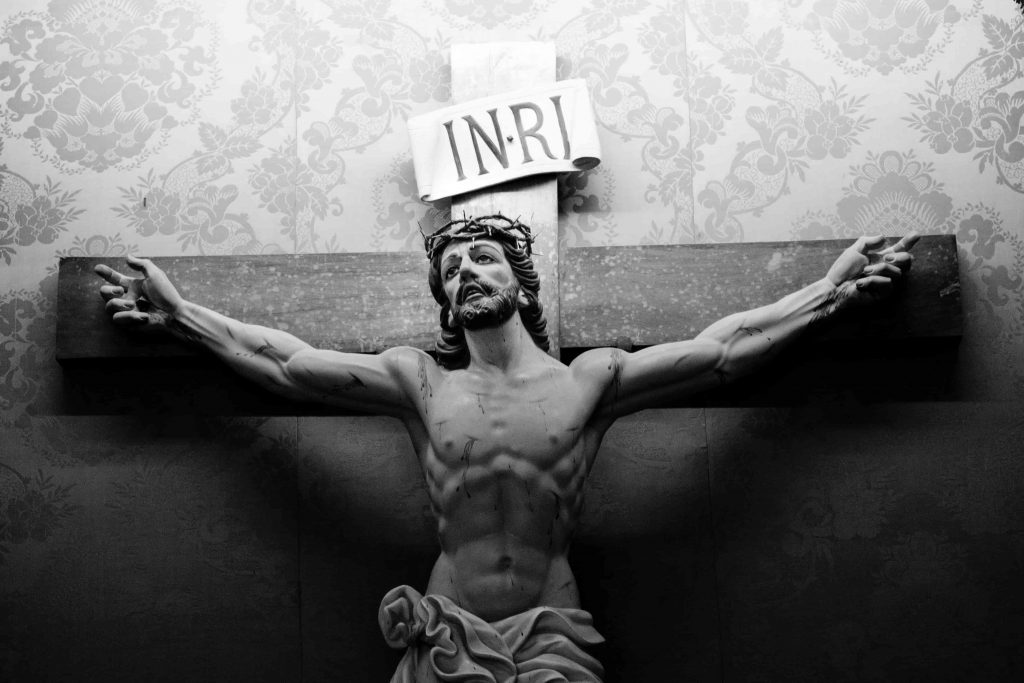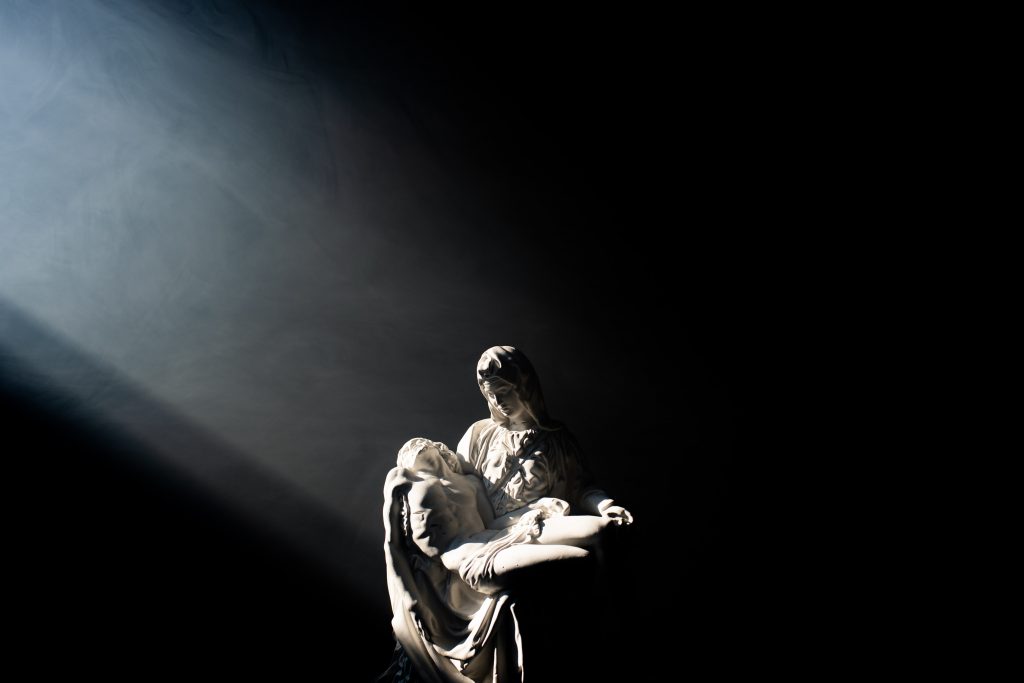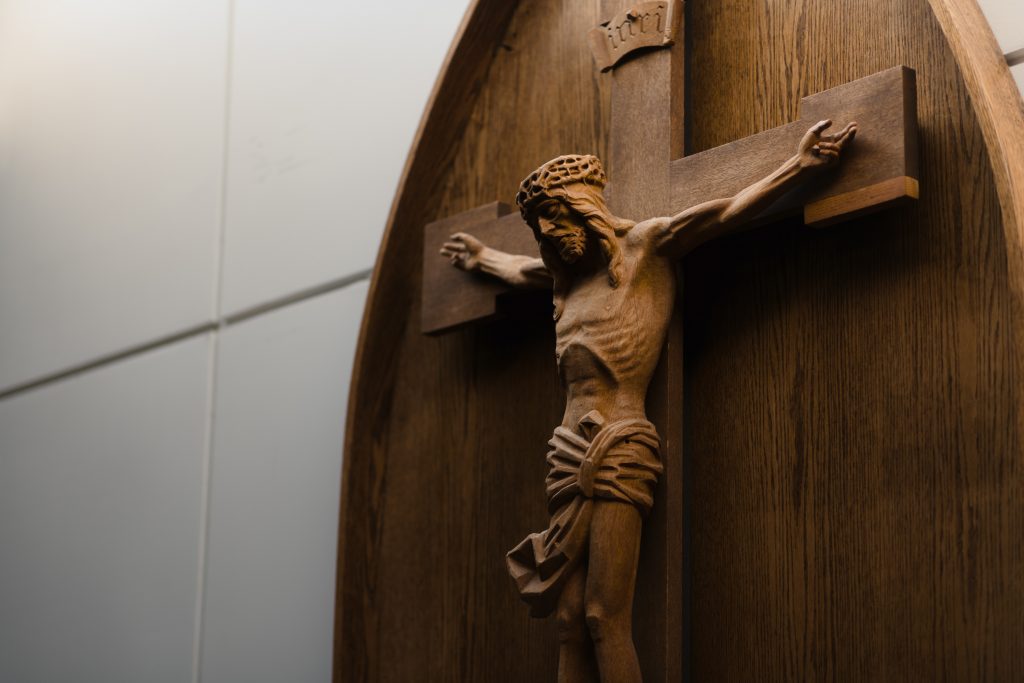Have you ever wondered why Catholics name the persons of the Trinity when making the sign of the cross?
“In the Name of the Father, and of the Son, and of the Holy Spirit. Amen.”
What’s the inherent connection between the Trinity and the cross?
The Scandal of the Cross
Well, as you know, at the end of his life our Lord Jesus Christ was crucified on a wooden cross.
And mind you, crucifixion in those days was the death of a criminal or a slave.
If you are one of the twelve apostles or one of our Lord’s disciples at the time of his crucifixion, you would have been scandalized.
Here being crucified is who you not only think is the messiah of God, but in some mysterious way, God Himself.
It wouldn’t make any sense to you that God would die, let alone die the death of a slave.
But today we have a better understanding of our Lord’s crucifixion. It wasn’t merely an act of capital punishment, it was also a free act of self-sacrifice on the part of our Lord for the salvation of our souls.
RELATED: 5 Prayers Before Mass and Communion
As the Church teaches, it is through the death and resurrection of our Lord that we are given the gift of eternal life.
The Trinity & the Sign of the Cross
However, it begs the question… Did our Lord have to die such a brutal death to save us?
Couldn’t he have just snapped his fingers and fixed everything?
Well, there are a lot of responses that could be given to that question. But I want to offer just one that I believe shows us the inherent connection between the Trinity and the cross.
And, in order to do so, I need to bring to your attention one of the most famous scripture passages in St. Paul’s Letter to the Philippians:
“Have this mind among yourselves, which is yours in Christ Jesus, who, though he was in the form of God, did not count equality with God a thing to be grasped, but emptied himself, taking the form of a servant, being born in the likeness of men. And being found in human form he humbled himself and became obedient unto death, even death on a cross.”
–Philippians 2:5-8
Notice in this passage how it describes our Lord as having chosen a path of humility despite being God. It’s almost as if the text is claiming that our Lord acted in a way contrary to the character of God.

But I don’t think that is true. It seems to make more sense that our Lord, in becoming man and dying on the cross, instead manifested the humility in God.
And this is one of the reasons why a well-known bible scholar, named Michael Gorman (endorsed by Catholic bible scholars Brant Pitre and Michael Barber), among many others, believes that the better english translation of this passage, based on the original Greek manuscripts, reads:
“Christ Jesus, who, [because] he was in the form of God, did not count equality with God a thing to be grasped, but emptied himself, taking the form of a servant, being born in the likeness of men.”
By just swapping the word “though” with “because” it completely changes the meaning of the text.
Rather than our Lord becoming man and dying on the cross despite being God, he does these things because he is God.
And this, I believe, is the inherent connection between the Trinity and the cross.
The Cross is a Sign of Love
Though the cross scandalized the apostles and early disciples of our Lord at the time of the crucifixion, we today, because of them, can see that the cross is an historical expression of what our Lord does in his divinity.
RELATED: Sacred Scripture and Sacred Tradition – Are Both Needed?
In other words, the cross reveals the inner life of the Trinity.
Our Lord does not empty himself in his humanity despite being divine. He empties himself in his humanity because he is divine.
In a sense, that is what it means to be divine––to empty oneself.

And that is who God is as Trinity: a communion of persons in a state of eternal self-emptying love.
And if you read the passage in Philippians further, you will discover that, according to St. Paul, it is because of our Lord’s willingness to self-empty that he is exalted by the Father and given a share in the Father’s glory:
“Therefore God has highly exalted him and bestowed on him the name which is above every name, that at the name of Jesus every knee should bow, in heaven and on earth and under the earth, and every tongue confess that Jesus Christ is Lord, to the glory of God the Father.”
-Philippians 2:9-11
Never Make the Sign of the Cross the Same Way Again
So what does this mean for our faith?
Well, it should change the way we look at the cross. And it should change the way we make the sign of the cross.
So often we make the sign of the cross like it’s no big deal.
We do it so quickly it’s not even in the shape of a cross. Or we do it so mindlessly that we don’t even realize what we’re doing.
That should change.
Every time we begin our prayer and make the sign of the cross, our hearts and minds should be drawn into the mystery of the Blessed Trinity and the mystery of self-emptying love–––the deepest mysteries of our Faith.
RELATED: Surrender Prayer: Give Jesus Everything
Yes, our Lord emptied himself and gave himself up to death on a cross for us. And yes, he rose from the dead so that in him we could have new life.
And so, when we make the sign of the cross, let us remember the new life we have in Him. And because in Him, in the Trinity.

Also, it should change our priorities.
As we’ve discovered in St. Paul’s Letter to the Philippians, glory is not found in self-seeking but in self-emptying.
If we want to share in God’s glory and be raised up by the Father we must be willing to empty ourselves in love.
In the Christian life, there is only one way up and that is down.
Meaning, to be the greatest we must be willing to be the least. To love ourselves we must be willing to forget ourselves.
This is what is revealed every time you make the sign of the cross.
What are your thoughts about this ancient Catholic prayer and ritual?
Let me know below in the comment box!

